President Muhammadu Buhari last week assented to the N21.83 trillion 2023 appropriation bill into law, his last as Nigerian president.
The president had in the fiscal document proposed an annual budget of N20.51 trillion for 2023, showing a 19.8 percent increase from the N17.13 trillion approved for 2022, including the supplementary budget.
The president said the aggregate expenditure of N21.83 trillion was an increase of N1.32 trillion over the initial executive proposal of a total expenditure of N20.51 trillion.
He explained that the 2022 Supplementary Appropriation Act would enable the administration to respond to the havoc caused by the recent nationwide floods, which took a heavy toll on infrastructure and agriculture.
Similarly, the president had also informed the lawmakers that the government would take another N1 trillion loan from the Central Bank of Nigeria (CBN) through Ways and Means. The additional N1 trillion would take the total Ways and Means Advances from the CBN to N23 trillion, which the government seeks to convert to bonds.
However, many experts have criticised the 2023 budget, describing it as unimplementable. One concerning aspect is the rising debt profile of the country.
Eyebrows were also raised when the federal government disclosed that the incoming administration would inherit about N77 trillion in debt by the time President Buhari’s tenure ends in May this year.
To be sure, the budget deficit under President Buhari’s administration would hit a record high at N55.3 trillion in eight years, with the passage of the N21.83 trillion 2023 budget whose deficit is over N10 trillion.
Indeed, an assessment by this newspaper shows that every Nigerian would have pay N60,000 in extra taxes to fund the N12trn deficit in the budget.
And by the time Buhari leaves office on May 29, when the debt management office says the public debt would have reached N77trn, every Nigerian by then would owe N385,000.
With the national debt now exceeding $84 billion, or about 25% of GDP, there is growing concern about the sustainability of the country’s financial situation.
At the heart of the problem is the fact that Nigeria’s economy has been struggling in recent years. Despite being one of the largest oil producers in the world, the country has been hit hard by the fall in oil prices, which has been depressed since 2014, while money made from other sources apart from oil has been abysmal.
No doubt, the country has a huge revenue problem, no matter government’s explanation that what the country is struggling with was a revenue problem.
To shore up its revenue, the government has been forced to borrow heavily to finance its operations.
While it is understandable that the government would turn to borrow in times of economic hardship, the sheer scale of Nigeria’s debt has become a cause for concern. The country’s debt-to-GDP ratio is now higher than that of many other developing countries, and there are fears that the country may struggle to meet its debt obligations in the future.
One of the main drivers of Nigeria’s rising debt profile has been the government’s reliance on short-term borrowing to finance its operations. This has led to a significant increase in the country’s debt service costs, as the government has had to pay higher interest rates to attract investors.
To address these challenges, the government will need to take several steps in the coming years. First and foremost, it will need to focus on improving the country’s economic growth. This will require a combination of structural reforms and targeted investments in areas such as infrastructure, education, and healthcare.
In addition, the government will need to take steps to reduce its reliance on short-term borrowing. This could involve increasing its access to long-term financings, such as through the issuance of bonds. It will also be important for the government to improve its debt management practices, including establishing clear rules for the use of debt and ensuring that its borrowing is used in a transparent and accountable manner.
There is also a need to make an intentional effort to diversify the country’s resources and curb the high level of corruption and wastefulness in government business.
In the considered opinion of this newspaper, increasing taxes now would be the final nail in the coffin of most small and medium businesses in the country. Widening the tax net should be the target, not increasing taxes.
Needless to say, efficient tax administration will help Nigeria to tackle its debt and revenue challenges.
Also, stopping crude oil theft and blocking leakages in revenue-generating agencies will go a long way in improving the country’s revenue.
Without a doubt, Nigeria’s rising debt profile is a cause for concern. The government must take steps to address the underlying issues. By focusing on economic growth, reducing its reliance on short-term borrowing, and addressing the root causes of its economic challenges, the government can put the country on a more sustainable financial footing and ensure that it has the resources it needs to meet the needs of its citizens.
We’ve got the edge. Get real-time reports, breaking scoops, and exclusive angles delivered straight to your phone. Don’t settle for stale news. Join LEADERSHIP NEWS on WhatsApp for 24/7 updates →
Join Our WhatsApp Channel










